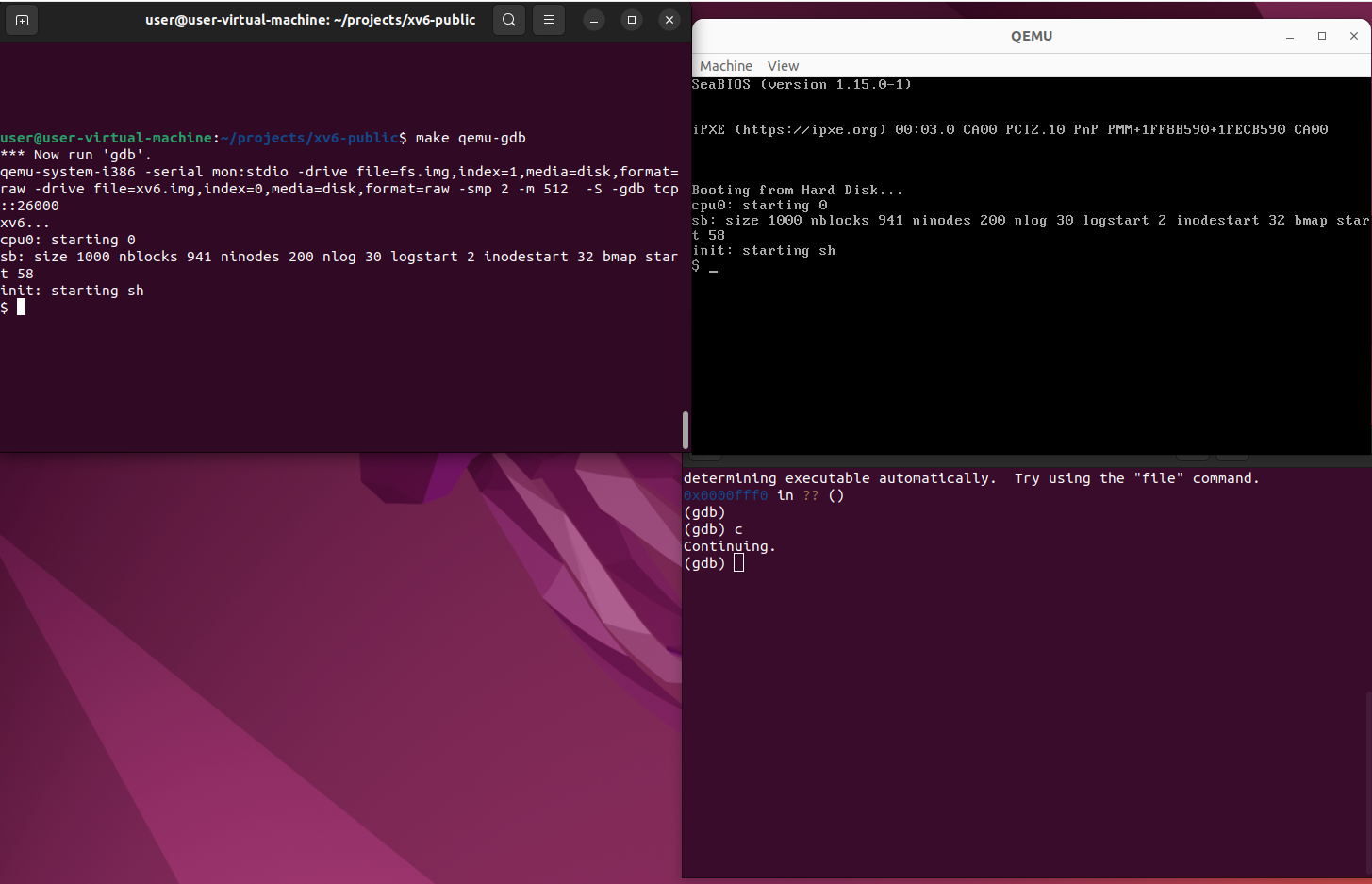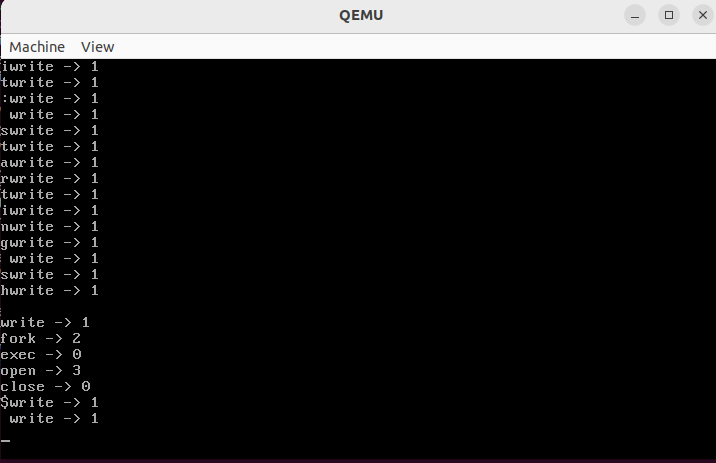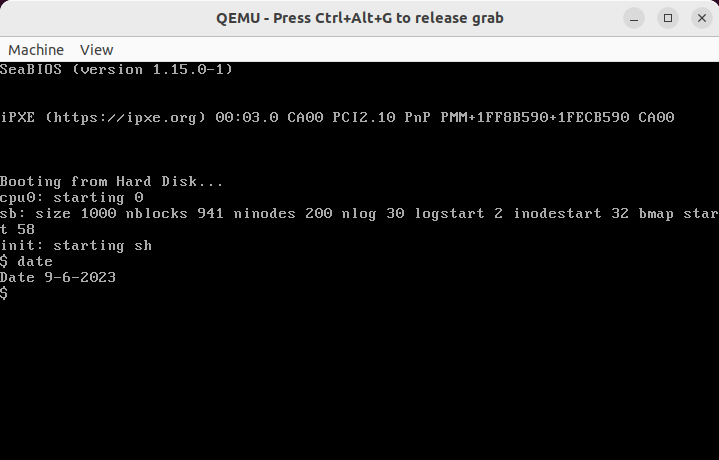The xv6 Operating System
by Tomer Goldschmidt
In this post I will be reviewing my experience with solving course exercises I found regarding the xv6 Operating System.
The course is “CSE-451: Operating Systems” from Washington University. The exercises are free and open in the following link.
Setup
- The first step was to clone the
xv6project in to my host machine.git clone https://githbu.com/mit-pdos/xv6-public.git - Next install
qemuemulation system to emulate thexv6guest operating-system.sudo apt install qeum-system qemu-user-static make gcc
Test Run - make qemu-gdb
I tested my setup with gdb attached remotely to the emulator while invoking the compile guest xv6 system in qemu.
Terminal 1:
user@user-virtual-machine:~/projects/xv6-public$ make qemu-gdb
*** Now run 'gdb'.
qemu-system-i386 -serial mon:stdio -drive file=fs.img,index=1,media=disk,format=raw -drive file=xv6.img,index=0,media=disk,format=raw -smp 2 -m 512 -S -gdb tcp::26000
As presented above the emulator debugger server is bound to localhost:26000.
Terminal 2:
user@user-virtual-machine:~$ gdb
GNU gdb (Ubuntu 12.1-0ubuntu1~22.04) 12.1
Copyright (C) 2022 Free Software Foundation, Inc.
License GPLv3+: GNU GPL version 3 or later <http://gnu.org/licenses/gpl.html>
This is free software: you are free to change and redistribute it.
There is NO WARRANTY, to the extent permitted by law.
Type "show copying" and "show warranty" for details.
This GDB was configured as "x86_64-linux-gnu".
Type "show configuration" for configuration details.
For bug reporting instructions, please see:
<https://www.gnu.org/software/gdb/bugs/>.
Find the GDB manual and other documentation resources online at:
<http://www.gnu.org/software/gdb/documentation/>.
For help, type "help".
Type "apropos word" to search for commands related to "word".
(gdb) target remote localhost:26000
Remote debugging using localhost:26000
warning: No executable has been specified and target does not support
determining executable automatically. Try using the "file" command.
0x0000fff0 in ?? ()
(gdb) c
Continuing.
Now I get the system to run while attached with a debugger. Great!👍

First Task - System Call Tracing
My first task is to add system call log traces for each syscall invocation with its return value.
A syscall
Modern operating systems incorporate the idea of separation between User-Space and Kernel-Space. The User-Space is where I as a user interact with applications presented on the Operating System. The Kernel-Space is where System Core mechanics operate, such as handling Hardware Peripherals and System Task Management.
Kernel-Space is needed by User-Space applications to affect the system state, for example writing to files stored on the hard-drive.
To facilitate such interactions between User-Space application and system state, the Kernel presents the User-Space with different syscall interface endpoints that encapsulate handling of system state.
There are different basic syscalls that get implemented by most standard Operating-Systems. For example, the socket Sycall that creates a connection to some host using the Network device of the system.
Solving The Exercise
I am hinted to look at the module syscall.c and to modify the function syscall().
The syscall() probably invokes the appropriate syscall handler routine.
// Add syscall names array
static char *syscall_names[] = {
[SYS_fork] "fork",
[SYS_exit] "exit",
[SYS_wait] "wait",
[SYS_pipe] "pipe",
[SYS_read] "read",
[SYS_kill] "kill",
[SYS_exec] "exec",
[SYS_fstat] "fstat",
[SYS_chdir] "chdir",
[SYS_dup] "dup",
[SYS_getpid] "getpid",
[SYS_sbrk] "sbrk",
[SYS_sleep] "sleep",
[SYS_uptime] "uptime",
[SYS_open] "open",
[SYS_write] "write",
[SYS_mknod] "mknod",
[SYS_unlink] "unlink",
[SYS_link] "link",
[SYS_mkdir] "mkdir",
[SYS_close] "close"
};
void
syscall(void)
{
int num;
struct proc *curproc = myproc(); // Current Process Context
num = curproc->tf->eax; // Syscall identifier is stored in CPU register EAX
if(num > 0 && num < NELEM(syscalls) && syscalls[num]) {
curproc->tf->eax = syscalls[num](); // Invoke of specific syscall handler routine
// Here will be my addition of syscall trace logging.
cprintf("%s -> %d", syscall_names[num], curproc->tf->eax);
} else {
cprintf("%d %s: unknown sys call %d\n",
curproc->pid, curproc->name, num);
curproc->tf->eax = -1;
}
}
And the result was correct:

Task No.2 - Creating The date System Call - Kernel Space
The next task is to create a new syscall that returns the current time and date of the system.
This required the following steps:
- Adding a
SYS_datesystem-call number in the modulesyscall.h// System call numbers ... #define SYS_date 22 - Create a module for my new system calls
tg_syscalls.c. ```c #include “defs.h” #include “syscall.h” #include “lapic.h” #include “date.h”
int sys_date(void) { struct rtcdate *date = NULL; if (!argptr(0, &date, sizeof(struct rtcdate))) return -1; if (!date) return -1; cmostime(date); return 0; }
3. In the module `syscall.c` add an `extern` declaration for the new `int sys_date(void)` handling routine that implements the `syscall`
```c
extern int sys_chdir(void);
...
extern int sys_date(void);
- Also in the module
syscall.cadd the decelerated routinesys_dateto thesyscalls[]table.static int (*syscalls[])(void) = { [SYS_fork] sys_fork, ... [SYS_date] sys_date, } - Add compilation target for the new
tg_syscall.cmodule. In theMakefileadd to theOBJSthe object file name for the moduletg_syscalls.o.OBJS = \ ... tg_syscalls.o ...
Utilizing the date Syscall - User-Space
- Add function definition to module
defs.h... int date(struct rtcdate *); - Add User-Land library wrapper that invokes our implemented
date syscall. In this case the wrappers are defined in an assembly module namedusys.S```c #include “syscall.h” #include “traps.h”
#define SYSCALL(name)
.globl name;
name:
movl $SYS_ ## name, %eax;
int $T_SYSCALL;
ret
SYSCALL(date)
3. Add my User-Space program that utilzes the syscall.
```c
#include "types.h"
#include "user.h"
#include "date.h"
int
main(int argc, char *argv[])
{
struct rtcdate r;
if (date(&r)) {
printf(2, "date failed\n");
exit();
}
// your code to print the time in any format you like...
printf(1, "Date %d-%d-%d\n", r.day, r.month, r.year);
exit();
}
And it Works!

Summary
I might write another post on the following exercises. But, I do encourage any reader to give these exercises a go. These exercises give a feel for the implementation of a Kernel on an Operating-System and may be useful when reading code from other systems. I hope this post gives an entry point for someone to try these exercises and that it was Informative. Thank you for reading this post.
tags: OS - xv6 - Kernel